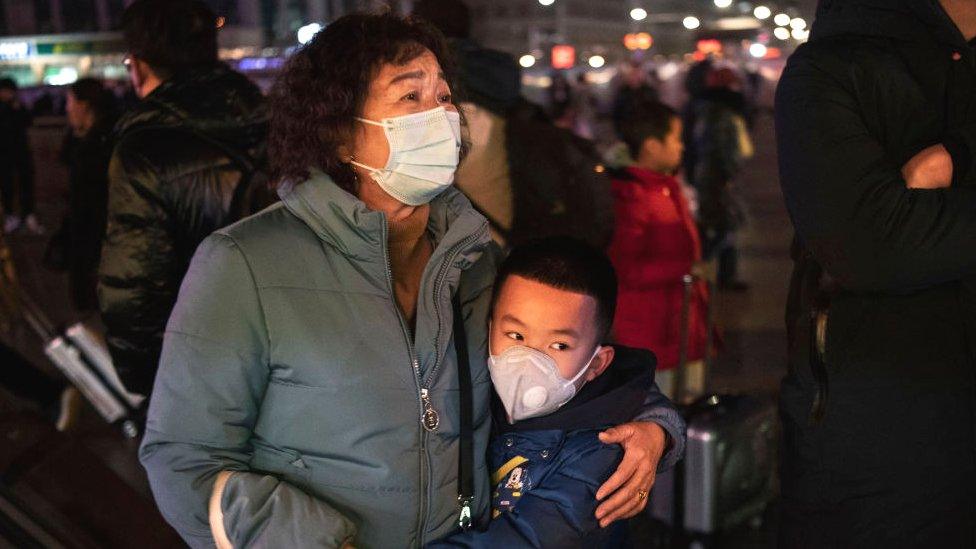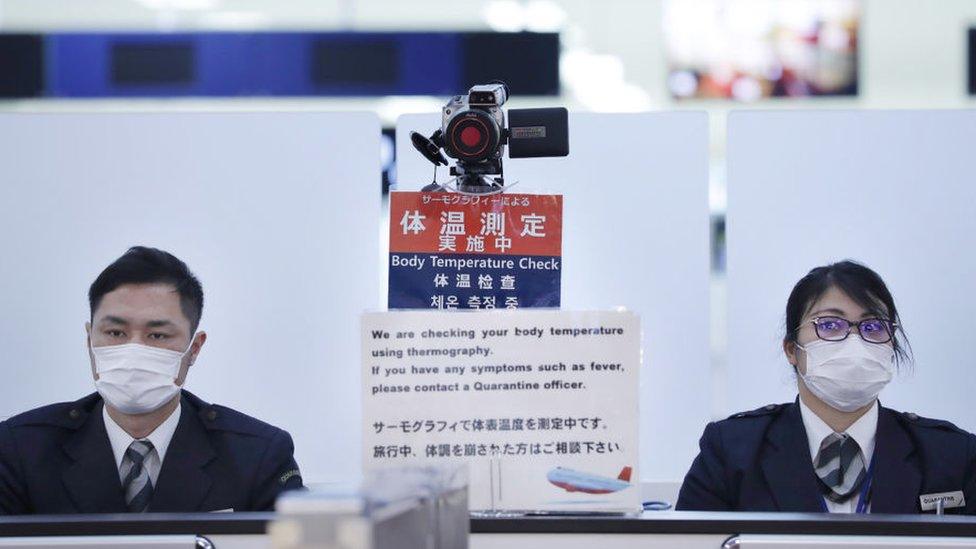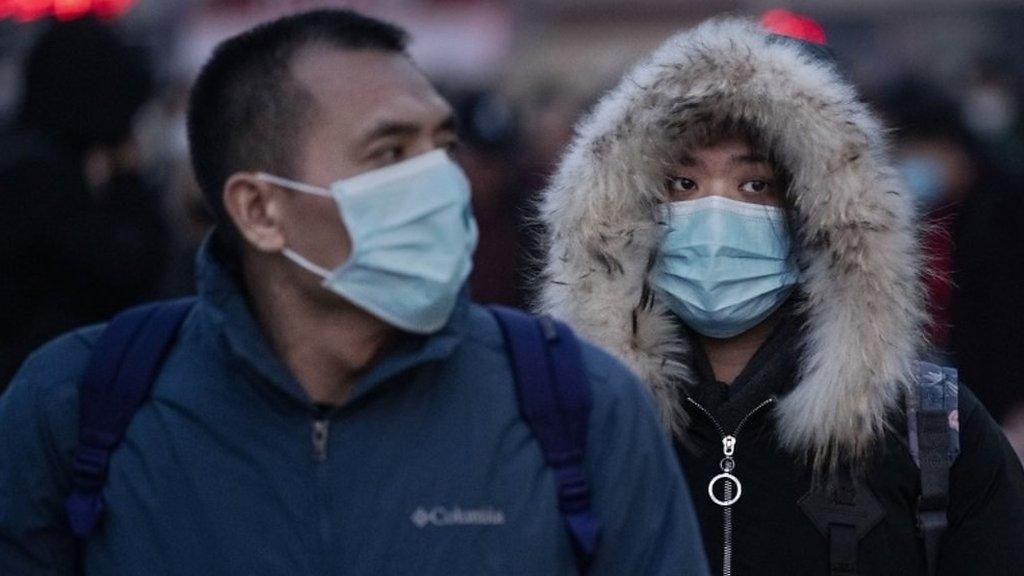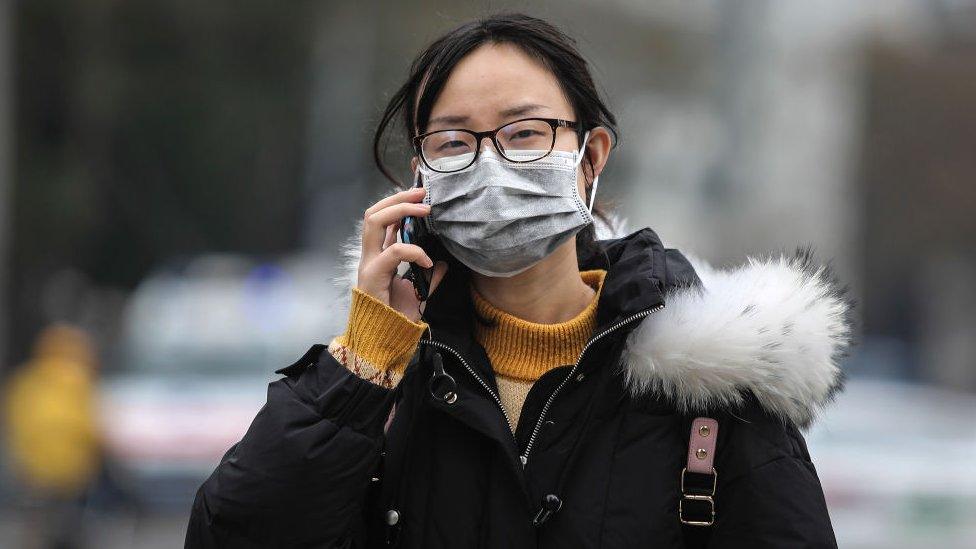Coronavirus: China advises against travel to Wuhan as deaths surge
- Published
The BBC's online health editor talks us through what we know about the virus
Chinese authorities have urged people to stop travelling in and out of Wuhan, the city at the centre of a new virus outbreak that has killed 17 people.
Those living in the city of 8.9 million people have also been told to avoid crowds and minimise public gatherings.
The new virus has spread from Wuhan to several Chinese provinces, as well as the US, Thailand and South Korea.
There are 440 confirmed cases, with the origin a seafood market that "conducted illegal transactions of wild animals".
Late on Wednesday the Chinese authorities confirmed the number of dead had almost doubled - from nine - in the space of a day. All fatalities so far have been in Hubei, the province around Wuhan.
Officials in Hong Kong also reported the territory's first two cases, external.
Meanwhile, in Geneva, the World Health Organization's emergency committee is meeting to assess the global risks posed by the virus and decide if it should be declared an international public health emergency - as happened with swine flu and Ebola.
Such a declaration, if made, could see advice issued on travel or trade restrictions.
Chinese authorities admitted the country was now at the "most critical stage" of prevention and control.
"Basically, do not go to Wuhan. And those in Wuhan please do not leave the city," said National Health Commission vice-minister Li Bin in one of the first public briefings since the beginning of the outbreak.


Earlier this week, China confirmed that human-to-human transmission of the virus had taken place.
The virus, known also as 2019-nCoV, is understood to be a new strain of coronavirus that has not previously been identified in humans. The Sars virus that killed nearly 800 people globally in the early 2000s was also a coronavirus.
Signs of infection with the new virus include respiratory symptoms, fever, cough, shortness of breath and breathing difficulties.
The first US case was confirmed on Tuesday. President Donald Trump said the situation was "totally under control" and that he trusted the information being provided by Chinese authorities.
What is the latest on the outbreak?
China health officials: "Don't go to Wuhan, don't leave Wuhan"
Mr Li said there was evidence that the disease was "mainly transmitted through the respiratory tract". In general, coughs and sneezes are a highly effective way for viruses to spread.
But China has still not been able to confirm the exact source of the virus.
"Though the transmission route of the virus is yet to be fully understood, there is a possibility of virus mutation and a risk of further spread of the epidemic," said Mr Li.
He added that there were 2,197 people who were known to have come into contact with infected patients.
No "super spreader" - a patient who has transmitted the virus to more than 10 people - has been discovered so far.
At least 15 medical workers in Wuhan, who presumably came into contact with patients, are known to be infected.

Wuhan: Heart of the outbreak

It's not a Chinese mega-city as well known as Beijing or Shanghai, but Wuhan has connections with every part of the globe. Only slightly smaller than London, the city is home to an international airport that handles tens of millions of passengers each year.
These global links explain why the cases of the virus abroad have all involved people either from Wuhan or who had recently visited it.
The city has economic clout too - nearly half of the world's 500 biggest companies have invested there.

How fast is the virus spreading?
There's no way to know but it's likely to be exacerbated by the millions of people across China who are travelling within the country for the Lunar New Year week-long holiday. Thousands are also travelling abroad.

Authorities confirmed that human-to-human transmission of the virus had taken place
Mr Li added that the festival would "increase the risk of the disease spreading and the difficulty of prevention and control".
He said strict measures to control the disease would be put in place, calling for those in Wuhan to "avoid crowds and minimise public gatherings".
These measures include temperature screening for all those leaving Wuhan, and improved sterilisation and ventilation at major transport hubs.
A ban on the trade of live poultry and wild animals has also been implemented in the city. State media reports said police were conducting spot checks to make sure this was enforced.
The disease may have originally been passed from an animal to a human, said Gao Fu, director of the Chinese Centre for Disease Control and Prevention.

The outbreak is believed to have come from a market trading illegal wildlife in Wuhan
Where else have cases been reported?
There have been a handful of global cases: three cases in Thailand, one in Korea, one in Japan, one in Taiwan and one in the US.
On Wednesday, the city of Macau also reported its first confirmed case of the virus. The patient is said to be a businesswoman who arrived from Wuhan over the weekend.
Authorities in many places, including Australia, Singapore, Hong Kong, Taiwan, the US, Russia and Japan have stepped up screening of air passengers from Wuhan.
The UK is expected to begin screening passengers arriving at London's Heathrow airport from Wuhan.

Airports around the world have stepped up screening of passengers
In Australia, a man who had travelled to Wuhan has been placed in isolation and is undergoing tests.
Are the numbers accurate?
Experts say there could be many cases going undetected and they expect the official numbers to rapidly increase.
Researchers from the MRC Centre for Global Infectious Disease Analysis at Imperial College London now estimate that there have probably been about 4,000 cases in Wuhan.
The centre's director, Prof Neil Ferguson, however said that the Chinese authorities had been "remarkably open" amid an "enormously demanding situation".

How the virus has spread
31 December: China alerts the WHO about a spate of pneumonia-like cases in Wuhan
1 January: The seafood/animal market believed to be at the centre of the outbreak is closed
9 January: WHO says the infection is caused by a new type of coronavirus
11 January: First death confirmed
13 January: Virus spreads abroad, with a suspected case in Thailand
16 January: A case in Japan is confirmed
17 January: Second death - a 69-year-old in Wuhan
20 January: Number of cases triples to more than 200, and outbreak spreads to Beijing, Shenzhen and Shanghai; third death confirmed; Chinese officials confirm human-to-human transmission
21 January: US authorities announce the first case in North America - a man who had visited Wuhan
22 January: Death toll climbs to 17, with more than 400 cases confirmed


What is your question about the coronavirus?
In some cases your question will be published, displaying your name, age and location as you provide it, unless you state otherwise. Your contact details will never be published. Please ensure you have read our terms & conditions and privacy policy.
Use this form to ask your question:
If you are reading this page and can't see the form you will need to visit the mobile version of the BBC website to submit your question or send them via email to YourQuestions@bbc.co.uk, external. Please include your name, age and location with any question you send in.
- Published22 January 2020

- Published21 January 2020

- Published22 February 2022

- Published6 October 2021

- Published21 January 2020

- Published18 January 2020
